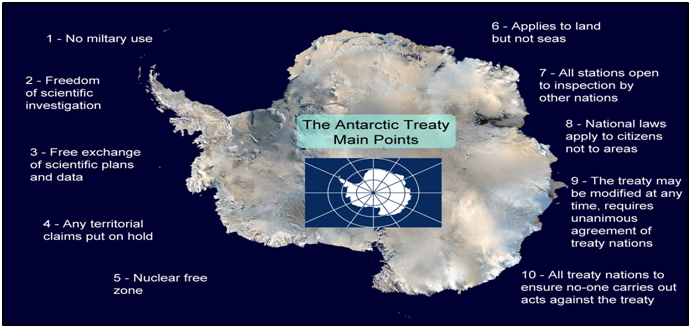Why in News?
- The Ministry of Earth Sciences (MoES) through the National Centre for Polar and Ocean Research (NCPOR) is hosting the ATCM 46 from May 20 to 30, 2024, in Kochi, Kerala.
- Kochi will also host the 26th Meeting of the Committee for Environmental Protection (CEP 26).
- This is consistent with India's ability to foster positive international discourse on scientific cooperation, environmental responsibility and Antarctica cooperation.
What’s in Today’s Article?
- What is the Antarctic Treaty?
- What is ATCM and CEP under the Antarctic Treaty?
- Key Items on the ATCM 46 and CEP 26 Agenda
- India’s Presence in the Antarctic
- Significance of Hosting ATCM 46 and Challenges for India
What is the Antarctic Treaty?

- The Antarctic Treaty was signed in Washington on 1 December 1959 by the twelve countries whose scientists had been active in and around Antarctica during the International Geophysical Year (IGY) of 1957-58.
- The 12 original signatories were - Argentina, Australia, Belgium, Chile, France, Japan, New Zealand, Norway, South Africa, the Soviet Union, the UK, and the US.
- It entered into force in 1961 and has since been acceded to by many other nations, taking the total number of Parties to the Treaty to 56 now.
- There are two types of parties to the Antarctic Treaty - Consultative (29) and non-Consultative (27).
- The latter are invited to attend the Consultative Meetings but do not participate in the decision-making.
- India has been a Consultative Party (those demonstrate their interest in Antarctica by conducting substantial research activity there) to the Antarctic Treaty since 1983.
What is ATCM and CEP under the Antarctic Treaty?
- Antarctic Treaty Consultative Meeting (ATCM):
- Convened annually, these meetings serve as forums for Antarctic Treaty Consultative Parties and other stakeholders to address Antarctica's pressing environmental, scientific, and governance issues.
- From 1961 to 1994 the ATCM generally met once every two years, but since 1994 the meetings have occurred annually.
- The ATCM is hosted by the Consultative Parties according to the alphabetical order of their English names.
- Committee for Environmental Protection (CEP):
- The CEP was established under the Protocol on Environmental Protection to the Antarctic Treaty (the Madrid Protocol) in 1991.
- The CEP advises the ATCM on environmental protection and conservation in Antarctica.
- The Antarctic Treaty Secretariat (ATS):
- Established in 2004, it serves as the administrative hub for the Antarctic Treaty System and coordinates the ATCM and CEP meetings.
- It also monitors compliance with Antarctic Treaty provisions and agreements and provides assistance and guidance to Antarctic Treaty Parties on treaty implementation and enforcement matters.
Key Items on the ATCM 46 and CEP 26 Agenda:
- ATCM 46 agenda includes:
- Strategic planning for sustainable management of Antarctica and its resources;
- Policy, legal, and institutional operations;
- Biodiversity prospecting;
- Inspections and exchange of information and data;
- Research, collaboration, capacity building and cooperation;
- Addressing climate change impacts;
- Development of tourism framework; and promoting awareness.
- CEP 26 agenda focus on:
- Antarctic environment evaluation, impact assessment, management, and reporting;
- Climate change response; Area protection and management plans including marine spatial protection; and
- Conservation of Antarctic biodiversity.
India’s Presence in the Antarctic:
- India’s first Antarctic research station, Dakshin Gangotri, was established in 1983.
- At present, India operates two year-round research stations: Maitri (1989) and Bharati (2012).
- The permanent research stations facilitate Indian Scientific Expeditions to Antarctica, which have been ongoing annually since 1981.
- In 2022, India enacted the Antarctic Act, reaffirming its commitment to the Antarctic Treaty.
Significance of Hosting ATCM 46 and Challenges for India:
- Significance:
- Through open dialogue, collaboration, and consensus-building,
- India remains committed to upholding the principles of the Antarctic Treaty and
- Contributing to the sustainable management of one of Earth's last pristine wilderness areas.
- The hosting of the 46th ATCM and 26th CEP meeting reflects India's growing role as a responsible global stakeholder in efforts to preserve Antarctica for future generations.
- Challenges:
- The 46th Antarctic Treaty Consultative Meeting begins under the shadow of the Ukraine-Russia conflict, an issue that has been affecting the discussions for the past two years.
- Russia's increase in surveys of the Antarctic region for oil and gas reserves has also caused some anxiety among the partner nations.
- Canada and Belarus are seeking consultative status but their petitions have run into opposition.









